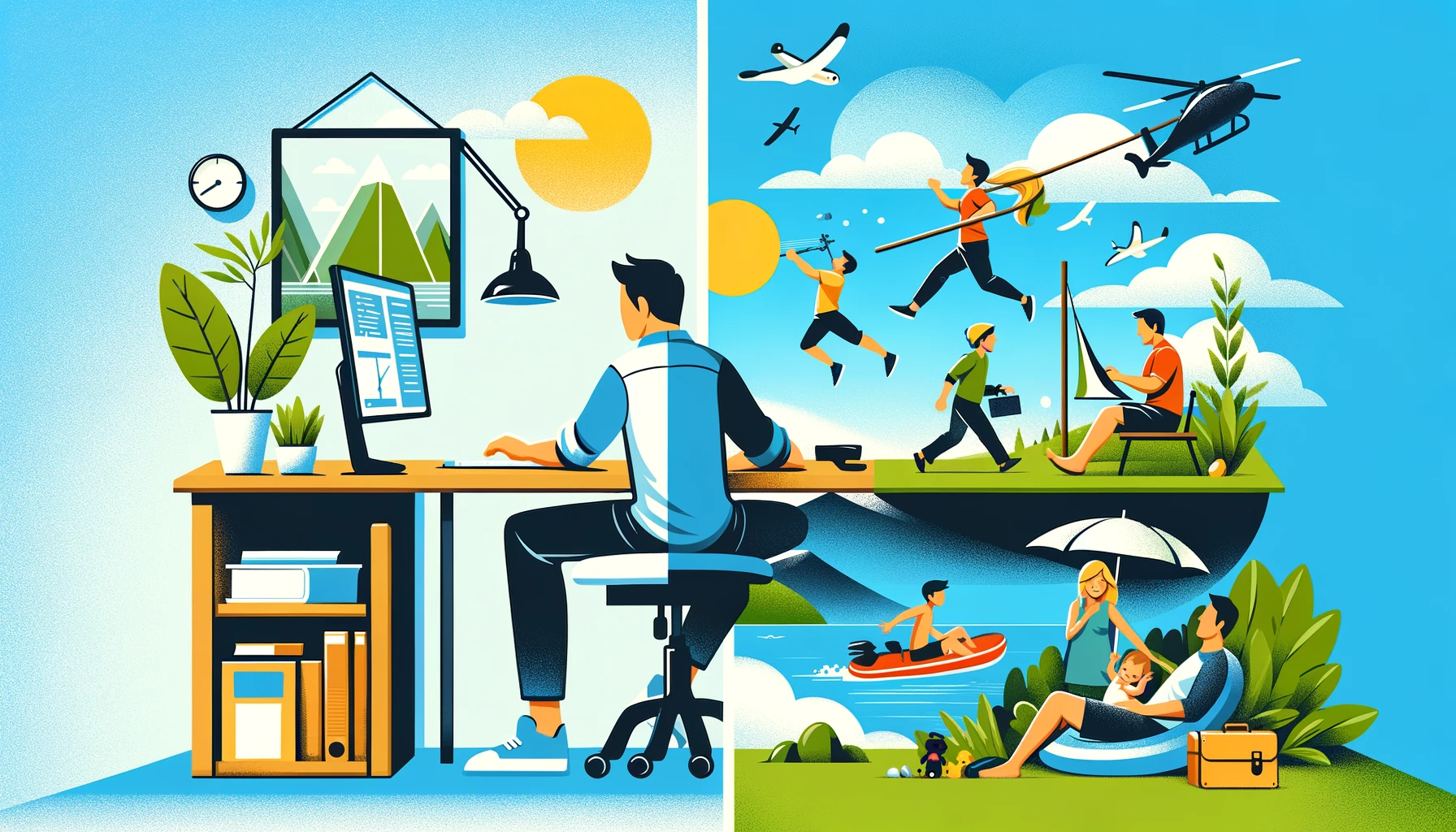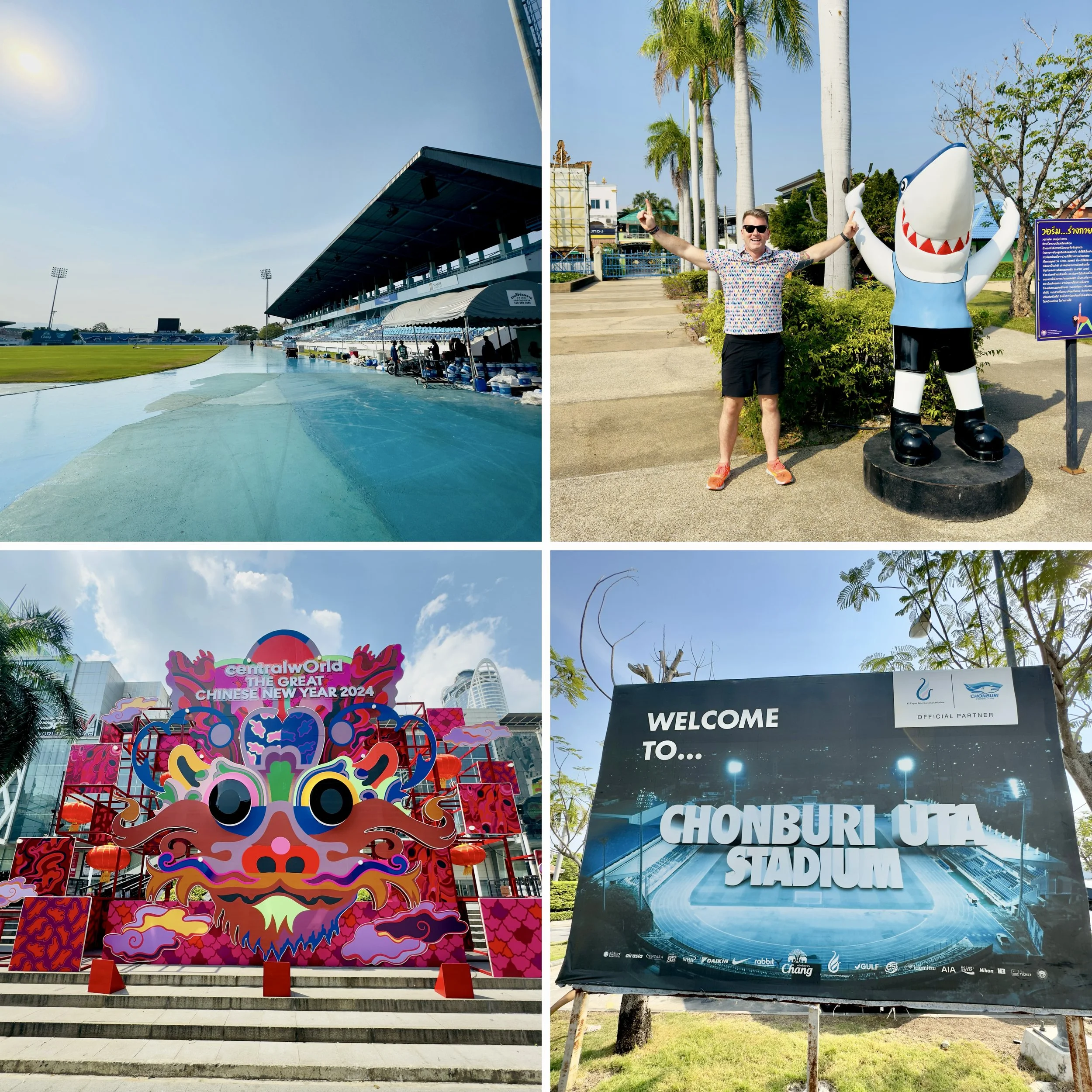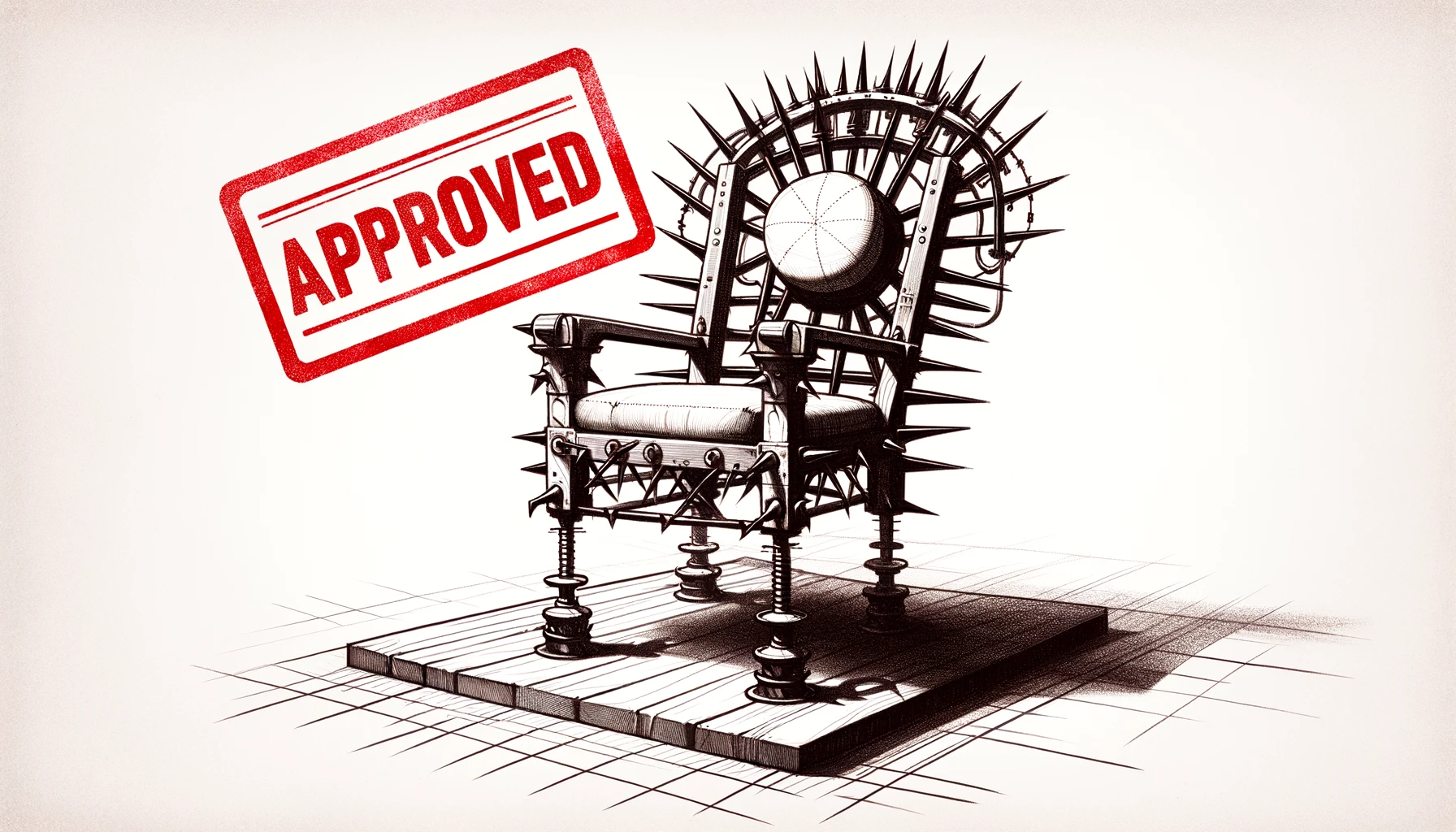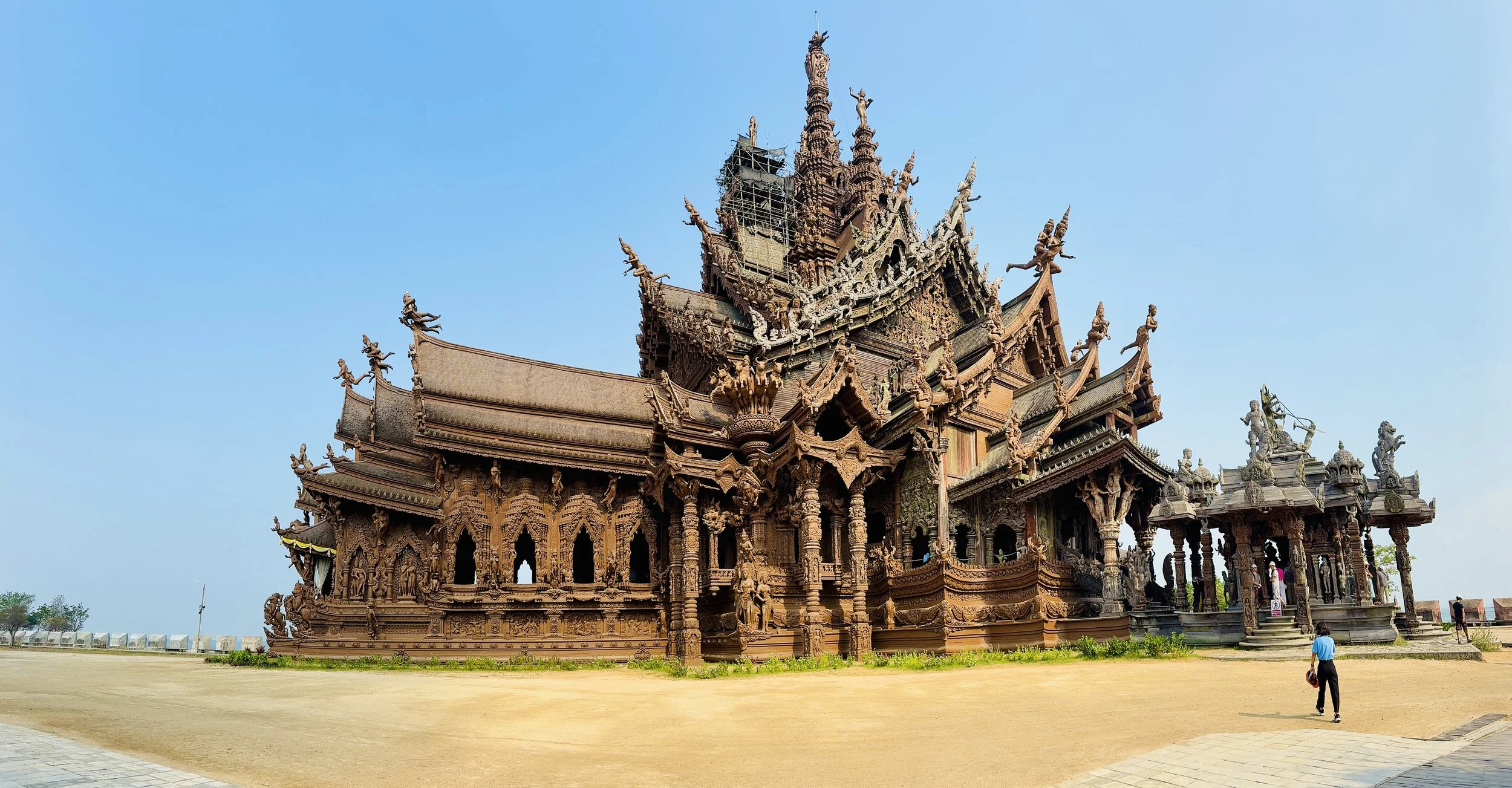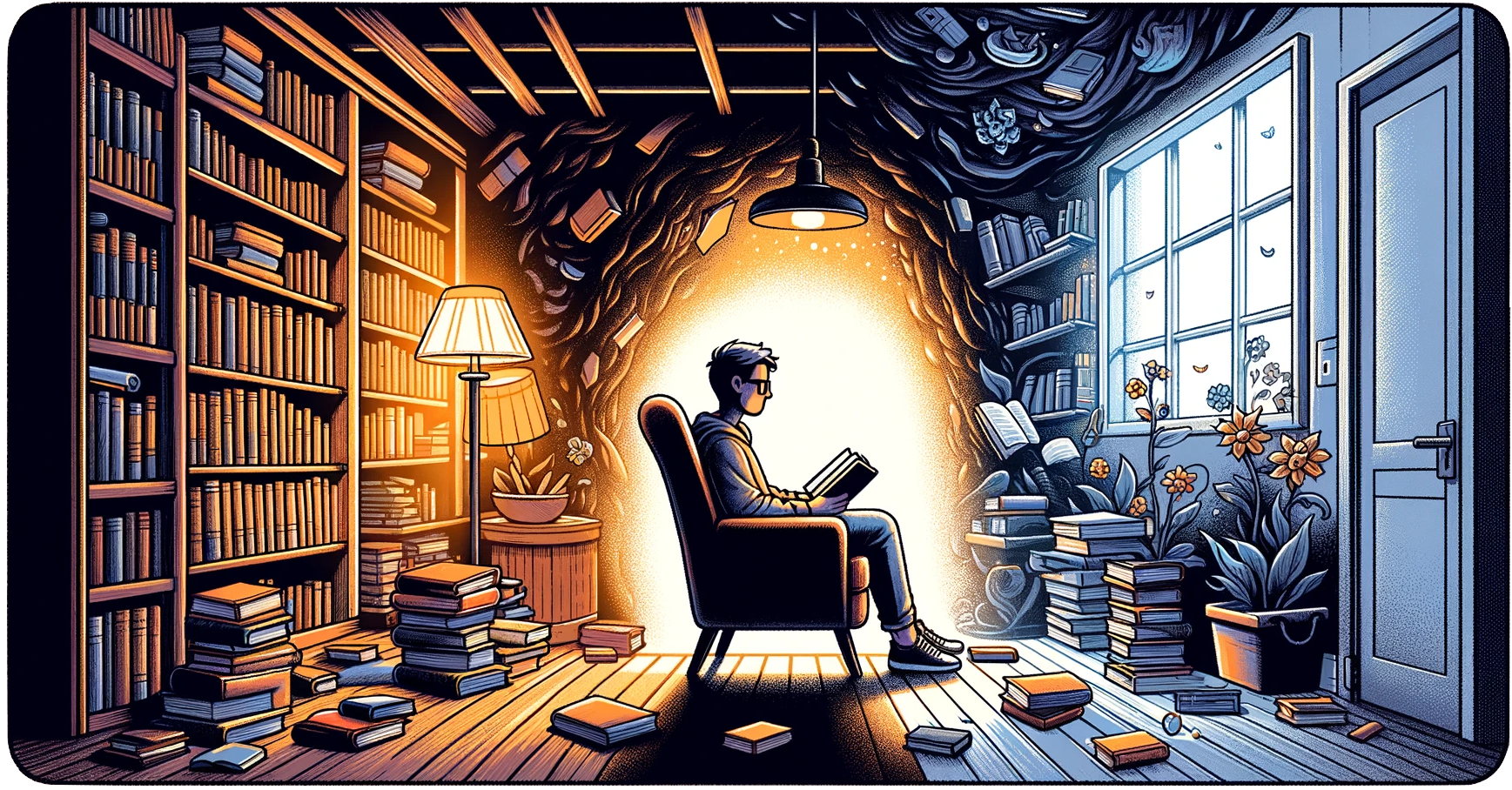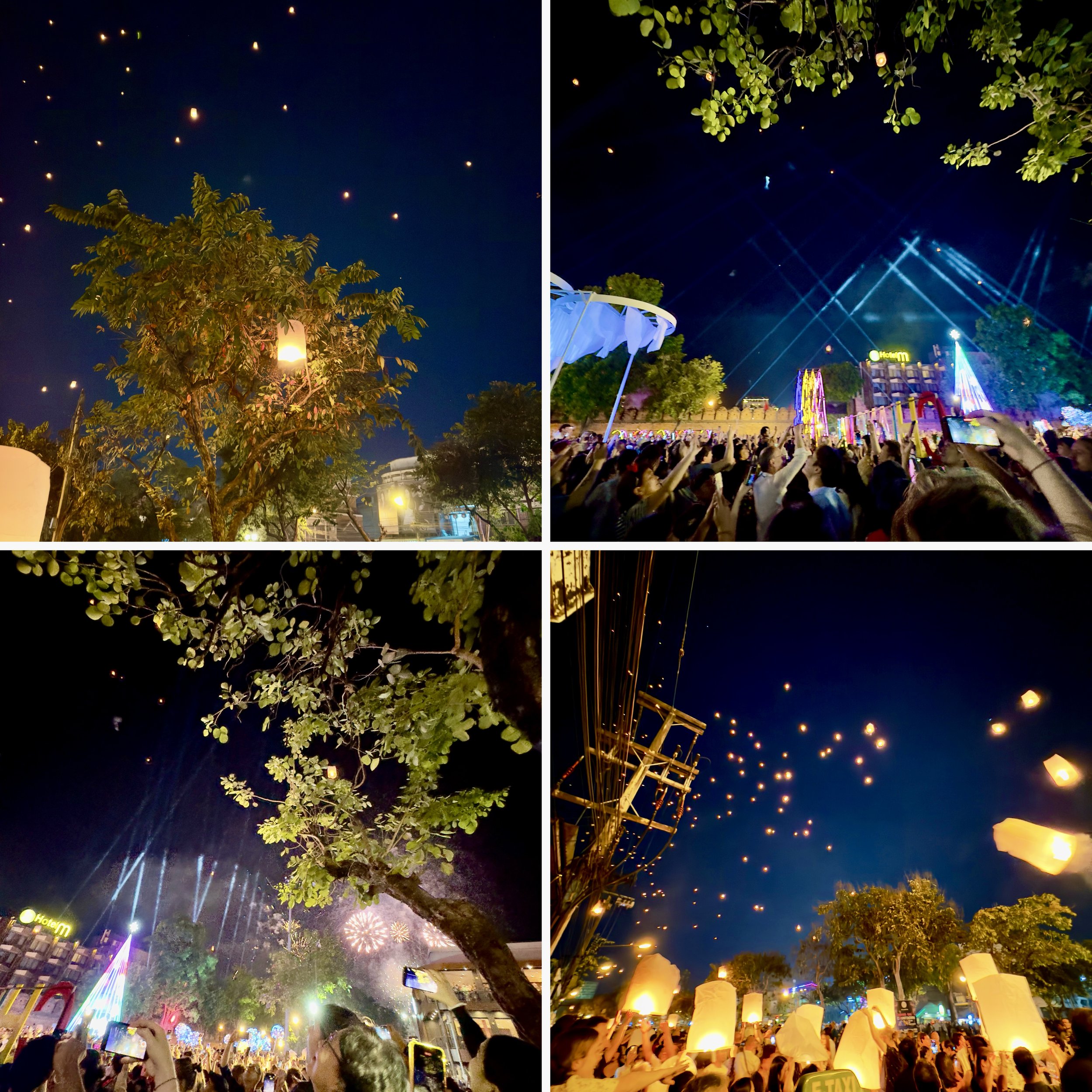
BLOG
Chinese Noodles
Since leaving China, I haven’t eaten a ton of Chinese food. But sometimes, I get a hankering for Chinese beef noodle soup, and this new place in downtown Chiang Mai hit the spot. The dish on the left is fried noodles with veggies.
#4: Beyond the 9-to-5: Embracing Honesty in Our Work Lives
Let’s be honest — most of us are not honest at work. We lie, play into the politics, and try to be the good employee we think our boss expects us to be. What if, however, the workday is stripped of its glossy veneer, where candid conversations replace the scripted dialogues of professional life. In this alternate universe, the veil of career aspirations is lifted, revealing a more pragmatic and, perhaps, relatable view of work. Let's take a walk through this refreshingly honest landscape and explore what it would look like if we were all upfront about the work we do.
In this candid world, meetings become a different ball game. Gone are the days of nodding enthusiastically to every point made. Instead, participants openly admit, "I'm here because it's mandatory, but honestly, my mind is on the report due in two hours." This honesty could transform meetings from routine time-fillers into efficient, purpose-driven discussions.
In this honest work paradigm, it's crucial to acknowledge that for many, work has become the central pillar of their existence, often overshadowing other aspects of life. It's like a garden where the work tree grows so large that it blocks the sunlight from reaching other plants – our hobbies, passions, and personal pursuits. We've reached a point where the boundaries between work and personal life are increasingly blurred, leading to a scenario where work doesn't just occupy our time but consumes our identity. This new culture of candor invites us to reclaim our personal time, to nurture the diverse interests that make us who we are beyond our job titles. It's about redistributing the sunlight in our garden, ensuring that while work remains a significant tree, it doesn't hinder the growth of other plants that bring joy, fulfillment, and a sense of personal identity. We need to pivot back to living OUR lives, cherishing moments that are ours alone and not defined by our professional roles. This shift isn't just beneficial; it's necessary for cultivating a well-rounded, fulfilling life where work is a part of our identity, not the entirety of it.
For some, climbing the corporate ladder is a thrilling game of strategy and skill. I get it. Humans are built to try and overcome challenges. But in our honest world, many would openly admit, "I'm just here for the paycheck." This frank admission isn't about lack of ambition; it's a reflection of diverse motivations in the workforce. Some find fulfillment in their roles, while others view their job as a means to support their real passions outside of work. Climbing the corporate ladder in the traditional sense is like scaling a mountain whose peak is shrouded in clouds of prestige and power. In our honest world, many view their professional journey more like a trek through a scenic trail – it’s not about reaching the highest summit, but about the experiences and sustenance along the path.
Success, in this unfiltered environment, gets a new definition. It’s no longer just about promotions and accolades but also about work-life balance, personal happiness, and financial stability. Employees proudly say, "I work to live, not live to work," and that’s perfectly acceptable.
Imagine a culture where honesty about work motivations is not only accepted but embraced. It's a place where the pressure to feign unwavering dedication is lifted, leading to a more relaxed and possibly more productive environment. Transparency becomes the norm, leading to better alignment of roles with personal and professional goals.
In this honest world, employers recognize and respect the varied motivations of their employees. They understand that not everyone is vying for the corner office. This recognition leads to a more tailored approach to employee engagement, with a focus on creating value for both the company and the individual, regardless of their professional aspirations.
In this landscape of workplace honesty, the role of Human Resources undergoes a transformation as well. The often-criticized 'HR doublespeak' – the tendency to cloak straightforward messages in unnecessarily complex jargon – becomes a thing of the past. HR departments now communicate in clear, direct language, mirroring the candor of the workforce. This shift not only enhances transparency but also builds trust. Employees no longer have to read between the lines to understand policies or feedback. This straightforward approach by HR could lead to more meaningful interactions, clearer understanding of policies and expectations, and a general sense of authenticity in employer-employee relations. It might be hard for Karen from HR to let go of the old ways but I have faith.
If we were all honest about the work we do, the professional world would look vastly different. It would be a place where honesty about our motivations is the norm, not the exception. This transparency could foster a more inclusive and understanding work environment, where the pursuit of personal and professional goals, whatever they may be, is respected and supported. Ultimately, it's about recognizing that our relationship with work is as unique as we are, and there's nothing wrong with that.
Back in Chiang Mai
Chonburi, a city located on the eastern Gulf coast of Thailand, is renowned for its picturesque beaches, bustling seafood markets, and a dynamic cultural scene. As an important economic and tourist hub, Chonburi seamlessly blends traditional Thai culture with modern living. The city's coastal location makes it a popular destination for those seeking a blend of sun, sea, and sand, alongside rich cultural experiences. Chonburi also plays a significant role in Thailand's industrial sector, hosting several industrial estates that contribute to the country's economy. The city's vibrant street life, characterized by lively markets and local festivals, adds to its charm, offering visitors and residents alike a taste of authentic Thai lifestyle.
Chonburi FC, the city's pride in the realm of football, holds a special place in the hearts of local sports enthusiasts. Established in 1997, the club has grown in stature and success, becoming a formidable force in Thai football. Known for their spirited play and competitive spirit, Chonburi FC has garnered a loyal following, with fans passionately supporting the team through thick and thin. The club's success in domestic competitions has not only brought joy to its supporters but has also put Chonburi on the map in the Thai sports world. The team's home games, played at the Chonburi Stadium, are a spectacle of color and excitement, reflecting the community's strong bond with the sport.
Driving from Bangkok to Chiang Mai, a journey of about 9.5 hours, was an experience I'll long remember. The journey, though lengthy, was a reflection of my own commitment and passion for the things I hold dear. Traveling through diverse landscapes, from bustling cities to serene countryside, the drive was as much about the journey as the destination. Finally arriving in Chiang Mai, I felt happy to be home. The comfort of being back home, coupled with the memories of the road traveled, made the entire experience worthwhile. It's moments like these that remind me of the beauty and diversity of Thailand, and the enduring spirit of adventure that keeps me exploring and appreciating this beautiful country.
#3: Sitting Uncomfortably? The Unwelcome Art of Bad Design
In a world where we've mastered the art of self-driving cars and space tourism, it's perplexingly comical – or tragically ironic – that we still encounter the bane of everyday life: the uncomfortable chair. This seemingly trivial discomfort opens up a larger discourse on the pervasive nature of bad design in our society. Despite our advancements in technology and design, we often find ourselves ensnared in the clutches of poorly thought-out products.
It's a classic battle: cost efficiency vs. user comfort. In the quest to keep prices low, manufacturers often cut corners, leading to products that are the physical equivalent of a shrug. Cheaper materials might save a few dollars, but they also transform sitting into a game of musical chairs, where nobody wants to be left sitting when the music stops.
Consider the everyday office chair, which often feels more like a medieval torture device than a seat. This trend of sacrificing comfort for cost-cutting turns the act of sitting into a test of endurance, emblematic of a broader issue in product design and manufacturing.
Reflect on the standard keyboard, a straight path to carpal tunnel syndrome, and public transport seats that seem to discourage comfort rather than invite it. These are classic examples of the one-size-fits-all fallacy in mass production, where individual needs are sacrificed for uniformity and cost efficiency. While the market offers ergonomic keyboards and more comfortable alternatives, their hefty price tags relegate them to the realm of luxury rather than necessity. This disparity illustrates a troubling disconnect: between products designed for the masses and those catering to the comfort of a select few who can afford them.
In an era of mass production, uniqueness often becomes the first casualty. Imagine a world where chairs are made with the same carelessness as a hastily written text message – "good enough" replaces "well-crafted." These chairs are like ill-fitting clothes; they cover the basics but don't quite match our individual contours.
Somewhere between the drawing board and the showroom floor, the end user becomes a mythical creature – acknowledged but never truly understood. The result? Products that seem to be designed for a faceless, formless, and apparently discomfort-immune consumer.
Bad design does more than cause physical discomfort; it can also have a profound impact on our psychological well-being. Constant exposure to poorly designed environments and products can lead to frustration, diminished well-being, and a subtle feeling of being undervalued. Living in a world where every interaction with a product reminds us that our comfort and needs are secondary can subtly erode our sense of self-worth.
The prevalence of bad design speaks volumes about our societal values. It reflects a culture where efficiency and profits are prioritized over human-centered needs. This affects not only individual users but also has broader social implications, especially in terms of accessibility and inclusivity in public spaces and transportation.
Why is comfort often an afterthought in design? It's akin to making a birthday cake that looks stunning but tastes like cardboard. The aesthetics might draw us in, but it's the comfort that forms lasting relationships. An uncomfortable chair is more than a nuisance; it's a missed opportunity for designers to show that they understand and care about the user experience.
Rayong, Thailand
After a whirlwind week in Pattaya, with its early morning beer drinkers and boisterous nightlife, I was ready for a change of scenery. A short drive to Rayong promised just that. En route, an unexpected stop at Navy FC in Sattahip turned into a memorable highlight. There, amidst the humble setup of the local Thai Navy team, I found myself buying a jersey. The lady at the store, sensing my enthusiasm, offered a tantalizing proposition - if I could wait, she'd arrange for the entire team to sign the jersey and then ship it to me in Chiang Mai. Thai people are the best.
Sattahip is a quaint coastal district in Chonburi Province, Thailand, known for its deep ties to the Thai Navy. It exudes a unique blend of military precision and tropical serenity, characterized by well-kept beaches and a slower pace of life. The area is rich in natural beauty, with a number of hidden coves and pristine beaches, making it a haven for those seeking a peaceful retreat away from Thailand's more bustling tourist hubs. With a new sense of anticipation, I continued my journey to Rayong.
Rayong, in stark contrast to the unabated energy of Pattaya, welcomed me with its serene beaches and laid-back vibe. It's a blend of industrial vigor and natural allure, famous for its fruit plantations, especially durians and mangosteens. Rayong City, the provincial capital, offers a more authentic Thai experience compared to the tourist-heavy areas of Pattaya and Phuket. The province boasts unspoiled beaches along its coastline, providing the perfect backdrop for tranquil seaside vacations.
My visit to the Rayong FC stadium, while quieter and devoid of the bustling activity of a match day, was no less interesting. Wandering alone around the pitch, I felt a sense of tranquility and wondered how many people actually come to the games here. Though I couldn't find a store selling a jersey there, the quest continues. With plans to head to Bangkok on Sunday and a quiet hotel just a stone's throw from the beach in Rayong, the hunt for a Rayong FC jersey adds an exciting purpose to my upcoming adventures.
Roadtrip To Pattaya, Rayong, & Bangkok
Decided to take a roadtrip down to Pattaya, then over to Rayong on Friday, then to Bangkok on Sunday to do some shopping. It was around a 9 hour drive from Chiang Mai, which isn’t terrible, but definitely a first time, last time experience. Pattaya is cool, though I’m not drinking and need to work in hotel all afternoon, but it’s a nice change of pace from northern Thailand, at least for a bit. Will be back in Chiang Mai around January 27th.
The Sanctuary of Truth | Pattaya, Thailand
The Sanctuary of Truth in Pattaya, Thailand, stands as an awe-inspiring testament to traditional craftsmanship and philosophical depth. Constructed entirely of wood, this massive structure soars to a height of 105 meters, embodying a fusion of art, culture, and faith. The sanctuary, a brainchild of Thai businessman Lek Viriyaphant, is a unique architectural feat, showcasing intricate carvings that depict stories and teachings from Buddhism and Hinduism. It’s more than just a building; it's a reflection of the complex interplay of Eastern spiritual beliefs, portrayed through stunning sculptures and design elements that capture centuries of religious art and mythology.
This majestic structure is not just a place of worship, but a monumental artwork that transcends conventional religious boundaries. Each carving, each pillar tells a story, weaving a tapestry of moral and philosophical teachings. The Sanctuary of Truth is a reminder of the universal truths that underpin different faiths, emphasizing the commonalities in the quest for meaning and enlightenment. Its location by the sea adds to its mystical allure, with the ocean's vastness complementing the grandeur of this architectural marvel.
However, despite its grandiosity and deep symbolism, the Sanctuary of Truth can be a conundrum for visitors. It's not a temple in the traditional sense, nor is it an ancient site imbued with historical legacies. This recent construction, an amalgamation of various religious beliefs, might puzzle those seeking a pure, singular religious experience. But it’s worth acknowledging the vision and ambition behind its creation. It's commendable how Lek Viriyaphant utilized his resources, not just for personal gain, but to create something that sparks deep thought and appreciation for the diversity of spiritual narratives. While it may not fit neatly into conventional categories, the Sanctuary of Truth stands as a testament to human creativity and the pursuit of philosophical and artistic excellence.
*I had to wear those brown pants because my gym shorts were “too short” despite acknowledging the fact this was indeed, not a temple.
#2: Embracing the 'I': My Journey from Skeptic to Advocate of First-Person Narratives
Let's get this out there: I once had a bias against first-person novels. Why on earth would I want to read a whole book stuck in someone else's head, listening to their incessant 'I did this, I felt that'? It's as if the literary world forgot there are other ways to tell a story. They certainly don’t do this in movies. They hardly ever strap a camera onto the protagonist's face for two straight hours — except for that one time with 'Hardcore Henry,' but that's a whole other can of worms. So why should I, a self-respecting reader, subject myself to this narrative tyranny? Every time I picked up a book and saw that solitary 'I' staring back at me, it was an instant no-go.
For years, this bias influenced my choices. A quick glance at a book; if I spotted an unquoted "I," back on the shelf it went, where it belonged. But in 2019, Haruki Murakami’s "South of the Border, West of the Sun" transformed my perspective. As I delved into Hajime's world, I realized that the power of first-person narrative lies in its mimicry of real-life storytelling. Suddenly, the 'I' in the novels felt like a friend sharing their story, and my aversion turned into appreciation.
This newfound appreciation, however, now presents me with a creative challenge. My previous novels, "Contraception" and "A Viral State," were written in third person. How do I, as a writer, distinguish my own voice from a first-person narrator? I ponder Melvin Burgess’s approach in "Junk," with its jarring shift of narrators, each chapter told from a different character’s perspective. Should I maintain a single, consistent voice, or should I juggle multiple perspectives? It’s a conundrum I’m still unraveling.
Reflecting on this shift in perspective, I've come to appreciate the unique intimacy first-person narratives offer. Unlike the detached observation of third-person, first-person writing invites readers into the inner world of the character. It's a space where thoughts and feelings are not merely observed, but lived. This intimacy creates a bond between the reader and the narrator, one that's akin to a personal conversation. It's a journey into someone else's psyche, where every joy and sorrow is felt firsthand. This realization has not only expanded my reading repertoire but also opened new avenues in my own writing. It challenges me to step into the shoes of my characters, to see the world through their eyes, and most importantly, to convey their stories with authenticity and depth.
There's a deeper reason why first-person narratives can be so captivating. Psychological studies suggest that when we read in the first person, our brains often process the experiences as if they were our own. This phenomenon, known as 'experience-taking,' can be incredibly powerful. When we read "I felt heartbroken," or "I rejoiced," we may not just understand these emotions; we may feel them. This vicarious experience can forge a deep, empathetic connection between the reader and the character. It's akin to walking a mile in someone else's shoes, but through the pages of a book. This aspect of first-person narrative doesn’t just tell a story; it invites us to live it, breathe it, and feel it. In embracing this style, I’ve come to realize the immense potential it holds for creating empathy and understanding, something the world sorely needs. Such narratives aren't just stories; they're bridges connecting us to diverse experiences and perspectives, helping us to understand others and ourselves on a much deeper level.
Think my take on first-person narratives is dumb? Wait till you hear this. As a kid, I was baffled by money. Watching my mom hand over $10 to a cashier and get back only $2 and an item seemed like a raw deal. My young mind couldn't grasp the concept of 'value' or 'cost.' I constantly thought we were getting ripped off. Compared to that, my views on narrative styles might not seem so outlandish now, eh?
For those who share my former skepticism towards first-person narratives, I would recommend this: imagine the narrator as someone recounting their tale over a drink. You’re just along for the ride, experiencing their world through their eyes. It's a perspective shift that might just change your reading experience. For me, embracing first-person narratives has been like learning a new language; initially foreign, now fluent, turning my 'I don't get it' into an 'I see it now,' one story at a time.
Donating Clothes
In the last weeks of 2023 and the beginning of 2024, I set a simple goal: gather 50kg of clothes for charity. Little did I know, this journey would turn into an avalanche of generosity, leading to a mountain of over 80kg of clothes, shoes, belts, purses, and more, thanks to the incredible support of friends and the local community.
I placed a donation box in my gym, which became a small beacon of communal goodwill. The response was overwhelming, and the box quickly filled.
The next hurdle was finding the right charity. My criteria were specific: no religious affiliations, just a direct, human-to-human connection. That's when I stumbled upon Eiamdee Recycle. This morning, as the founder himself picked up the donations, he shared his plan to collaborate with a local laundromat. Every piece we collected will be washed, sorted, and then find a new home in orphanages, schools, and with those in dire need.
This experience was a reminder of the power of community and the impact of collective action. I set out to gather 50kg of clothes, but ended up with something much heavier: a profound sense of connection and the undeniable proof that when we come together, we can create waves of positive change.
For those inspired to join this wave, reach out at +66 093 132 9168 or visit Eiamdee’s Facebook page: เอี่ยมดี.
#1: Navigating Futures – The Retirement Puzzle and the Paradox of Prosperity
I live in Thailand, and will likely retire here, hence the “Thai” money theme
Lately, at the age of 34, retirement has been on my mind more than ever. It's a distant milestone, but one that resonates strongly with my generation. We're known for hopping between jobs and often don't have the cushion of traditional pensions. As an expat, I'm faced with unique challenges, like being unable to contribute to a 401K. Planning for retirement, therefore, becomes a complex puzzle, peppered with uncertainties about lifespan, financial needs, and the ever-changing global economy.
A recent Twitter discussion brought to light a crucial comparison: the potential financial benefits of investing in the stock market throughout one’s working life versus relying solely on Social Security. The stark contrast was eye-opening. Those who invested independently seemed to be in a better financial position. This throws a spotlight on the reliability of Social Security, a system with no contractual obligation, often deemed an unstable safety net. Even economists like Milton Friedman have critiqued it as The Biggest Ponzi Scheme on Earth.
For me, retirement planning means making a singular, irreversible decision. I'm set on avoiding a return to work post-retirement. Therefore, generating passive income is key in my strategy. Property investment is my current focus. I own a condo in Chiang Mai and am planning another purchase in 2025, contingent on how my savings stack up in 2024. Despite its risks, real estate offers a tangible path towards financial security for someone without royalties or product sales.
It's intriguing how we perceive money. Way back when, trading was pretty much like a swap meet. You have a wheel of cheese, your neighbor has a chicken, and you'd strike a deal – no middleman, no fuss. But then, enter the big game changer: money. Imagine the look on someone's face when they're told, 'Hey, forget the cheese. How about this shiny coin with the king's mug on it?' It must have been a real head-scratcher. We went from bartering with stuff you can eat or use, to trading pieces of metal and paper that are, frankly, useless in a desert island scenario. It’s like someone waved a magic wand and said, 'This piece of paper? Yeah, it's now worth 10 chickens or a small goat.' It's kind of bizarre when you think about it – the whole concept of money relies on us all buying into this big idea that these coins and notes mean something. It’s like the ultimate trust fall exercise, but with the economy.
While the prospect of achieving what's often referred to as "Fuck you money" — the level of wealth that allows absolute financial freedom and power — might be out of my reach, my goal is more about comfort than command. This desire for comfort, I believe, resonates with many. 'Comfortable' is a subjective term, and its definition varies widely. For me, it means living without financial worry. I envision a life where I can freely choose what I want from a restaurant menu without a second glance at the prices, where I can generously give gifts to my loved ones during Christmas, and where an unexpected medical emergency won't threaten my financial stability. What that means in terms of annual salary, for me, would be around $100,000, which would also allow me to save a significant amount.
That being said, I'm embracing the art of spending money judiciously while also honing my saving skills. My spending is directed towards things that add genuine value and joy to my life – be it travel, the latest tech, or cherished signed jerseys. This approach stems from a fundamental belief: what is the point of all our hard work if we don’t allow ourselves to enjoy its rewards? Life, after all, is about finding that delicate balance between diligent saving and rewarding oneself for the efforts put in.
Navigating the financial aspects of life, especially planning for retirement, is a journey of balancing aspirations with practicalities. But again, easier said than done.
2023 New Year’s Eve
New Year's Eve in Chiang Mai was an eclectic mix of tradition and mild chaos, where even the anarchists couldn't resist scaling Tha Phae Gate. The city buzzed with energy, teeming with people, pulsating live performances, and an endless playlist of music. We clinked drinks under a canopy of lanterns, which painted the sky in hues of hope and adventure, although a few rebellious ones chose the embrace of trees, much to the audience's dismay.
For my personal 2023 escapades, I embraced the art of brevity through daily haikus. You can sneak a peek at these mini-literary escapades here.
I read 5 books, though not my best effort. Condo renovations took up a lot of my time in 2023, so I’ll work on upping that number for 2024.
Hard-Boiled Wonderland and the End of the World — Haruki Murakami
Never Split The Difference — Chris Voss
Fugitive Pieces — Anne Michaels
Atomic Habits — James Clear
The Godfather of Kathmandu — John Burdett
As we embark on this new orbit around the sun, I extend a heartfelt wish for a splendid 2024 to all. Here we are, standing at the threshold of a fresh chapter, ready to fill its pages with new adventures, lessons, and laughter. Let's dive into this year with the enthusiasm of explorers and the wisdom of sages. Happy New Year, and here's to a journey worth sharing every Sunday! 🌟🗓️🎉
2024 Goals
2024 Outlook:
I don't have major plans for 2024. My focus will be on simpler, more grounded goals, avoiding substantial changes or large-scale expenditures. Notably, I don't intend to purchase additional property, embark on significant travels outside of Asia, or undergo other major life alterations. However, I do anticipate seeking a new job, a prospect that doesn't excite me, but I recognize as a part of life's unpredictability.
Financial Reflections:
Lately, my thoughts have been centered on financial matters — strategies for earning, optimizing, and understanding the essence of "good" income. In Chiang Mai, where I reside, discussions about wealth are uncommon, and ostentatious displays of affluence are rare. Yet, questions about financial security, such as adequate savings for retirement and ways to increase my income, frequently occupy my mind. While I earn enough for a comfortable life in Thailand, I'm conscious of not getting overly fixated on finances, as this has previously added unnecessary stress. In 2023, such concerns were a source of tension, and I aim to be more mindful of my attitude towards money in the coming year.
Recent Purchase:
I upgraded my laptop in mid-December, buying a new 14” MacBook Pro (M3) to replace my slowing 2020 13” MacBook Pro (M1). With the trade-in, the total cost was around $1,500. As a professional reliant on my computer, especially while traveling, this purchase represents an investment in my future.
Finances:
Save $50,000
Buy and frame two signed jerseys in Chiang Mai
Invest $6,000 into my Roth IRA
Travels:
Visit Brunei
Travel to another destination in Asia/Oceania
Explore various locations in Thailand: Koh Kood, Koh Mak, and Surin
Oceania cruise (if the price is right)
Shopping:
Buy new gym shorts (preferably from LuLuLemon)
Avoid fast-fashion retailers
Life:
Renew my visa in August
Potentially change jobs
Read at least one book per month
Venture outdoors every Sunday, exploring new cafes/lunch spots
Publish a weekly blog post and share updates on Twitter every Sunday
Organize a clothing donation drive, aiming to collect and donate 50kg of clothes
Complete Google Project Management Certificate
Expand LinkedIn connections to over 500 (current count: 449)
Update my professional photo on LinkedIn
Attend at least one networking and one entertainment event in Bangkok
Get a new website logo from 99 Designs
New Directions: Revamping My Blog for a More Focused 2024 Adventure
Dear Readers,
I'm thrilled to share some big changes coming to my blog as we step into 2024. Your support and engagement have been the cornerstone of this journey, and it's time to shake things up a bit to enhance our shared experience.
First, I’ll be moving all Thailand posts from 2023 into the Thailand country blog. Alongside that, I’ll move country-specific travel posts to their respective blogs as well — for 2023, namely Maldives and Sri Lanka.
I'm excited to announce the launch of a fresh blog exclusively for 2024. This space will be a canvas for all my new adventures, thoughts, and experiences throughout the year. Expect vivid stories, deeper insights, and perhaps a few surprises along the way. To provide a consistent rhythm to our journey, I plan to post every Sunday for the rest of the year. This regular schedule not only helps me stay disciplined in sharing my adventures with you but also ensures you have something to look forward to each week.
In an effort to increase readership, I’ll also be posting each blog on my Twitter (which I rarely use) but I figured 2024 was as good a year as any to increase my social presence.
Depth matters in storytelling, and with that in mind, I'll aim for at least 500 words in each post. Whether it's detailing my week, covering my travels, or delving into topics that have caught my fancy, these longer posts are meant to provide a richer, more immersive experience.
Expect a mix of content — some posts will be travelogues from my 2024 adventures, while others might be reflective pieces or discussions on topics that have sparked my interest. The goal is to keep my content diverse and engaging.
Thank you for being a part of this journey. Your continued readership and feedback are what make this blog a treasure trove of shared experiences. Here's to a year of new stories, discoveries, and connections!
Warm regards,
Degen



